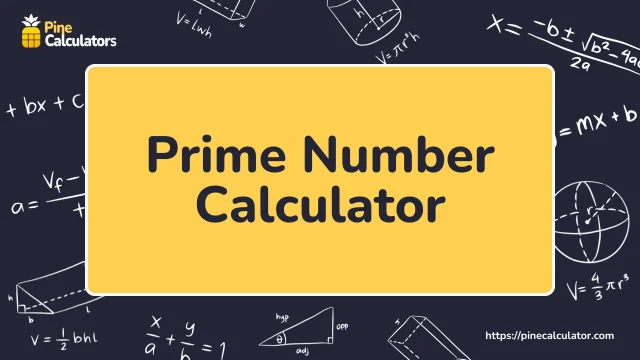Introduction to Prime Number Calculator
Prime number calculator is an online tool used to find the prime number from a cluster of numbers in less than a minute. Our tool evaluates the prime number and gives information on whether the given number is prime or not.

Prime numbers can be calculated easily if you use our prime calculator and get accurate results without any man-made error.
What is a Prime Number
A prime number is an integer or whole as it is greater than 1 and a divisor of a number 1 or itself, which is called a prime number. The prime number has a two factor only that is 1 or itself number.
For example, 4 is not a prime number because it is divided into 1,2,4, etc, it shows it has three factors so it does not satisfy the prime number condition.
What is the Greatest Prime Number
There are millions of prime numbers so it is difficult to recognize the greatest prime number from all but according to a recent discovery, 224,862,048 is the greatest prime number.
What is a Smallest Prime Number
Whether a prime number is small or large it has two factors only. As 1 is the smallest number in natural numbers it does not have two factors only so 1 is a composite number. The second smallest number is 2 which is divisible with 1 and itself so it is the smallest prime number.
How to Calculate a Prime Number using Prime Calculator
Prime numbers can easily be found if you know the basic principle for prime numbers followed by the prime number calculator. Let us explain the method of finding numbers with an example in steps and understand how the tool works.
For example, Find 45 a prime number or not?
Step 1:
The prime number solver Write down the number 45 and find all the factors of 45.
Step 2:
After finding all the factors of 45, it counts the factors.
Step 3:
If factor has two elements that is 1 and itself a number (it is a necessary condition for prime number) otherwise the given number is not prime.
Step 4:
The given number 45 ( 1,3,5,9,15,45 ) has 6 factors so it does not satisfy the necessary condition. That means 45 is not a prime number.
Solved Example for Prime Number
Let's see an example of a prime number question to understand the working machanism of prime number calculator
Example:
Find 30 is a prime number.
Solution:
$$ Factor\; of\; 30\; are\; 1,2,3,5,6,10,15,30 $$
For prime number a number must have two factors only but 30 have more than two factors.
Therefore 30 is a composite number not a prime number
Example:
Find 48 is prime number?
Solution:
$$ Factor\; of\; 48\; are\; 1,2,3,4,6,12,24,48 $$
For prime number a number must have two factors only but 48 have 8 factors that is more than two factors.
Therefore 48 is a composite number not a prime number
How to Use the Prime Number Calculator
Calculator prime has an easy-to-use interface so that you can use it to calculate the number questions.
Before adding the input of different types of numbers to check whether the given problem is a prime or not with solutions, you must follow some simple steps to avoid trouble in calculation process. These steps are:
- Enter the number in the input box of prime finder.
- Review your input number value before hitting the calculate button to start the calculation process in the prime numbers calculator.
- Click on the “Calculate” button to get the desired result of your given Prime number problem
- If you want to try out our prime calculator first then you can use the load example for a better understanding
- Click on the “Recalculate” button to get a new page for solving more number values of calculating prime number.
Final Result of Prime Number Solver
Prime number Calculator gives you the solution to a given number problem when you add the input to it. It provides you with solutions in a step-wise process. It may contain as:
- Result option
You can click on the result option and it provides you with a solution for prime numbers
- Possible step
When you click on the possible steps option it provides you with the solution where all calculation steps are included in detail.
Benefits of Using Calculator Prime
Prime calculator gives you tons of advantages whenever you use it to calculate a prime number problems for multiplication. These advantages are:
- Our prime number solver saves your time and effort from doing calculations to check either the given number is prime or not in a few seconds
- It is a free-of-cost tool so you can use it for free without evaluating the factors for prime numbers
- It is an adaptive tool that allows you to solve various types of numbers questions because it has a smart algortmic.
- You can use this prime finder for practice so that you get a strong hold on this concept.
- It is a reliable tool that provides exact solutions as per your input number whenever you use it to calculate a prime number problem.
- Prime number Calculator provides you solution with a complete process in a step-by-step method so that you get more clarity for the computation of prime numbers.










